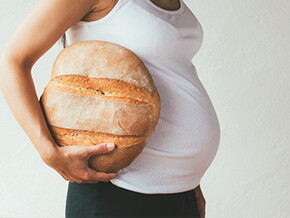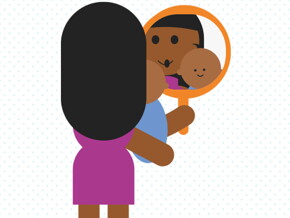
Baby crying can tug at your heartstring, leaving you feeling anxious, tense and guilty for not knowing what to do about it. Remember that it is perfectly normal for your baby to cry, and crying is your baby’s way of talking to you.
- Here are some reasons why your baby might be crying
- Hunger
- Physical discomfort (too hot, cold, sick, abdominal bloating, or wind).
- Over stimulated
- Tired or overtired
- Passing a bowel movement
- Colic
Hunger cry
- If breast-fed, your baby will need to feed every few hours during the day and when they wake overnight (unless instructed otherwise by your health care professional). Soon you will learn your baby's hunger cues.
- Keep your baby awake while feeding to ensure a good nutritive suck to satisfy their hunger.
- You may need to wake your baby for feeds if they sleep too long.
- Make sure there is good attachment to the breast otherwise your baby will tire before getting enough milk.
- Have your baby weighed regularly to ensure they are putting on a desired amount of weight.
Physical discomfort cry
- Massaging your baby daily will help calm your baby’s maturing nervous system.
- Have your baby assessed for reflux if they are:
- often unsettled and crying
- will not lie happily flat on their back
- screaming after vomiting
- gulping and swallows even when not feeding
- hiccupping frequently
- having difficulty settling to sleep
- Identify any intolerance to foods. There are telltale symptoms that can be assessed by your health care professional. Some of these signs include but are not limited to eczema or rashes, cradle cap, vomiting, bowel changes, excessive wind and bloating.
- Prevent overfeeding your baby.
- As a guide to ensure your baby is not too hot, or cold, dress your baby with one layer more than you.
- Try using a dummy. Sucking can be comforting to some babies.
- Sing or read to your baby. The rhythmical sounds of your voice are calming so don’t worry if you are off key!
- Observe for fever, lethargy, and less than six wet nappies in a day. Any of these symptoms may require a visit to the doctor.
Over stimulated cry
- Allow your baby space after each feed to move their limbs and be free from being held. Different temperaments will cope with different amounts of touch.
- Be aware that your baby may find lights, smells and noise of different places outside the home overwhelming and will be unsettled and cry either during the visit or after returning home.
- Try to reduce the time they are passed around from person to person for cuddles. Too many cuddles from too many different people can be tiring.
Tiredness cry
- Be mindful of how much sleep your baby requires and ensure they are given the opportunity to sleep at regular intervals;
- Establish sleep cues such as swaddling or offer a dummy. Sucking can be very soothing for some babies;
- Become aware of and watch out for tired signs such as jerky limb movements, facial grimacing, yawning, breaking eye contact and clenched fists. These are signs that your baby is ready to be settled to sleep.
Overtired cry
- Try not to ignore the tired signs outlined above, as this is the window of opportunity that makes it easier for your baby to settle into sleep. Overtired babies tend to sleep for shorter periods. If they do wake too early, resettle them back to sleep.
- Your baby will not attend well to the bottle or breast if they are overtired. Therefore, always feed them soon after they wake instead of before they are about to sleep;
- If your baby cries, they do not need to cry it out alone in their cot, instead hold them and be calm and comfort them;
Passing a bowel movement cry
- Your baby may cry before a bowel movement. It should not be associated with any other bowel changes such as blood, mucous, froth or anal fissures which are signs that need to be addressed by a health professional.
Baby colic cry
- The term baby colic is used when your baby is extremely unsettled, irritable and crying for long periods. Your baby may stiffen their back and not want to be held. All the usual comforting measures are not working and your baby is getting more desperate and so are you. This is a difficult time for parents. You feel useless and hope that you are not missing something serious.
Coping with the demands of your crying baby:
- Say yes to anyone that sincerely offers to help you.
- Build social networks with other like-minded parents who have young babies and children.
- Slow down your pace of life and be realistic about what you can do in a day. This precious phase of nurturing your baby will not last for long.
- Eat regular nutritional foods and avoid eating too much processed foods and sugars.
- Rest each day, preferably each time your baby rests;
- Do some form of outdoor exercise every day;
- Allow yourself and your partner some alone time to do something you enjoy;
- If you are alone and your baby’s crying is causing you to be extremely anxious or frustrated, put your baby safely in their cot or basket and leave the room until you are calmer. Call someone to help; if you are frightened you will hurt your baby.


















